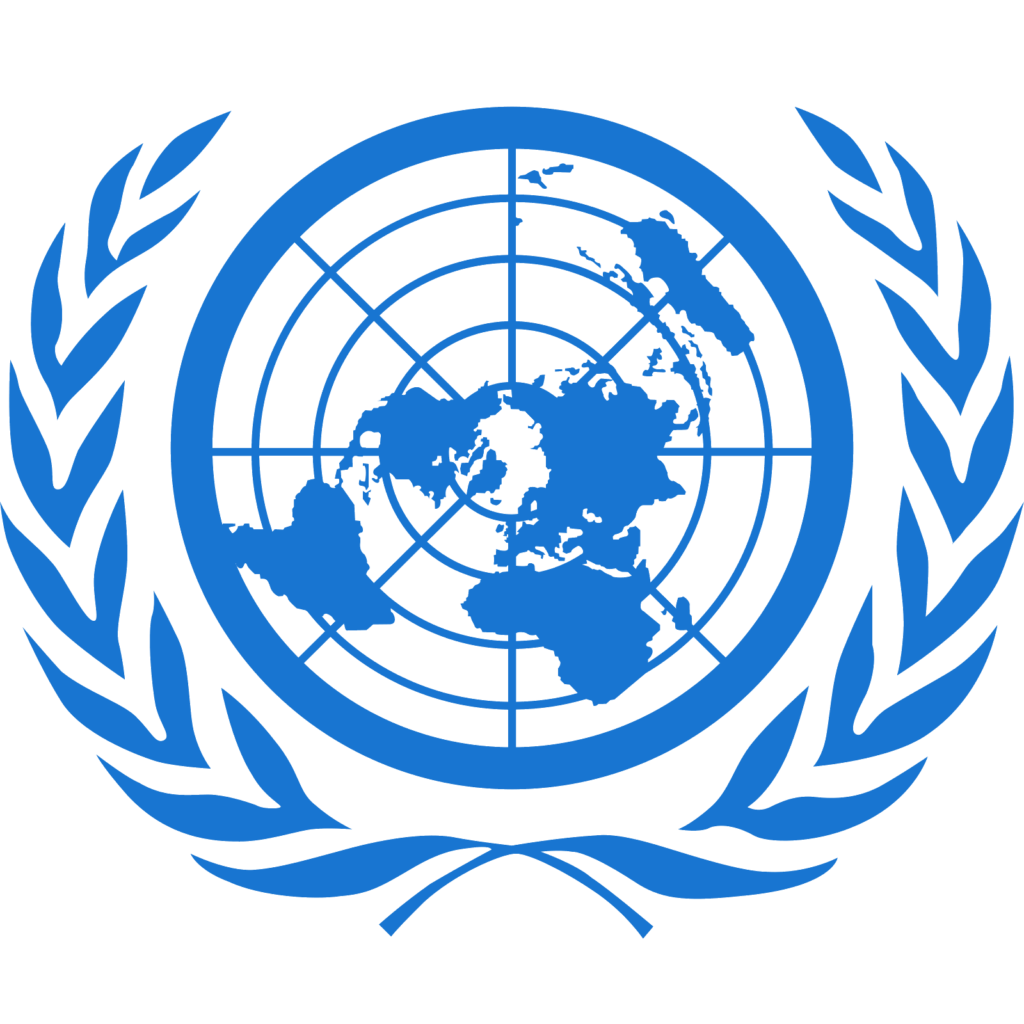
The United Nations (Also known as the UN) is the largest, most familiar, most internationally represented, and most powerful intergovernmental organization in the world. The united nation was established in 1945 soon after the end of World War II with the main aim of preventing future wars.
The United Nations is headquartered in First Avenue, UN Plaza, New York City, USA. The United Nations building stands on 17 acres of land donated by John D. Rockefeller on Manhattan Island, a suburb of New York. UN’s building is a 39 story building that can accommodate about 8000 employees.
United Nations (UN) other main offices in different countries are Geneva, Nairobi, Vienna, and The Hague.
The Official Languages Of United Nations Are
| 1. Arabic | 2. Chinese |
| 3. English | 4. Spanish |
| 5. Russian | 6. French |
- The United Nations (UN) was the second multipurpose international organization established with a worldwide membership.
NOTE:-
- Its predecessor, the League of Nations, was created in 1919 by the Treaty of Versailles and dissolved in 1946.
- Under Sukarno, Indonesia became the first and only country to leave the United Nations.
- The name “United Nations” was suggested by US President Franklin Roosevelt. It was first used in the Declaration of the United Nations made on 01 January 1942.
History
The United Nations (UN) is an international organization that focuses on international peace and stability. The United Nations was officially established in 1945 after the end of World War II when international leaders proposed the creation of a new international organization to keep the peace and avoid war. The United Nations initially had only 51 member states; Currently, the organization, which is headquartered in New York City, has 193 members.
As we know United Nations was born out of a perceived need, as a means of better mediation for international conflict and peace negotiations, as provided by the old League of Nations. As a formal act of protest against Germany, Italy, and Japan, the escalating World War II became the real impetus for the United Nations, Britain, and the Soviet Union to begin preparing the original United Nations Declaration signed by 26 nations in January 1942.
The principles of the United Nations Charter were first formulated at the San Francisco Conference held on April 25, 1945. The conference set out a structure for a new international organization, which was “to reaffirm the faith … to save future generations from the scourge of war”. In fundamental human rights … to establish conditions under which justice and respect for obligations arising from treaties and other sources of international law can be maintained, and to promote better standards of life in social progress and wider freedom give.”
Two other important objectives described in the Charter were respected for the equal rights of all peoples and the principles of self-determination (originally directed towards small nations now vulnerable to being swallowed up by communists emerging from the war) and economic International cooperation in solving social, cultural and humanitarian problems around the world.
Now that the war was over, negotiating and maintaining peace was the practical responsibility of the new United Nations Security Council, made up of the United States, Great Britain, France, the Soviet Union, and China. Each would have veto power over the other. Winston Churchill called on the United Nations to employ its charter in the service of creating a new, united Europe by uniting in opposition to communist expansion—East and West. Given the composition of the Security Council, this will prove easier than where.
United Nations Charter
- 51 nations met for a conference in San Francisco, USA, and began drafting the United Nations Charter, According to its charter (written grant), the United Nations aims to: to save succeeding generations from the scourge of war,…to reaffirm faith in fundamental human rights,…to establish conditions under which justice and respect for the obligations arising from treaties and other sources of International law can be maintained and to promote social progress and better standards of life in larger freedom. This means in simple words as, “the organization’s objectives include maintaining international peace and security, protecting human rights, providing humanitarian assistance, promoting sustainable development, and upholding international law. At the time of its founding, the United Nations had 51 member states; With the addition of South Sudan in 2011, membership is now 193, representing almost all of the world’s sovereign states.
[NOTE: United Nations charter was adopted on 25 June 1945 and took effect on 24 October 1945, when the United Nations began operations.]
- United Nations charters have 19 Chapters and 111 Articles which explain the objectives, principles, organs, and operating methods of the UN.
Objectives Of United Nation Are
1. Maintaining peace and security,
2. Developing friendly relations between countries based on respect for the principles of equal rights and self-determination of the people.
3. Worldwide cooperation to solve international economic, social, cultural, and humanitarian problems.
4. To respect and promote human rights.
5. To act as a center where countries can coordinate their actions and activities for these different purposes.
Principles Of United Nations Are
1. All member countries are equal.
2. The Member States shall faithfully discharge their obligations to the United Nations.
3. Member countries shall settle their international disputes by peaceful means.
4. The Member States must refrain from intimidation or use of force against any other State in their international relations.
5. The Member States shall render all assistance to the United Nations in any action in accordance with the Charter of the United Nations.
6. Countries that are not members of the United Nations must also act in accordance with these principles to maintain international peace and security.
7. No member state shall interfere in the internal affairs of any other country.
Organs Of United Nations Are
=> United Nations has six main organs and they are as follows :-
| United Nations Organs | Role | Members | Headquarter | Head |
| General Assembly | It is the main deliberative, policy-making, and representative organ of the United Nations. Comprising all 193 member countries, it provides a unique forum for multilateral discussions on international issues like peace and security, financing matters, etc | All 193 countries are the members | UN headquarter, Newyork, USA | Abdulla Shahid(The foreign minister of Maldives) |
| Security Council | It determines when and where UN peacekeeping operations should be deployed. | Total of 15 members out of which 5 are permanent members who have veto powers.The permanent members are United States, United Kingdom, France, Russia, and China. | Newyork, USA | Dmitry Manuilsky(the president in July addressed the Jewish Agency as ‘the representative of the State of Israel’.) |
| Economic and Social Council (ECOSOC) | It promotes high standards of living, full employment, and economic and social progress; identifying solutions to international economic, social, and health problems, etc. | 54 members | Newyork, USA | Oh Joon (South Korean ambassador) |
| The trusteeship council | The Trust examines and discusses the reports of the Administrative Authority on the political, economic, social, and educational advancement of the people of the regions and in consultation with the Administrative Authority, and from time to time investigates petitions and other special missions. | 5 permanent members | Newyork, USA | Anne Gueguen of France as its President and Jonathan Guy Allen of the United Kingdom as its Vice‑President. |
| International Court of Justice | It settles legal disputes submitted to it by states and gives advisory opinions on legal questions from U.N. bodies and agencies. | 15 judges | Peace Palace in The Hague (Netherlands) | Joan Donoghue |
| The United Nations Secretariat | it Performs the actual and administrative functions of the United Nations as directed by the General Assembly, the Security Council, and other organs. It is headed by the Secretary-General, who provides overall administrative guidance. | As of 2012, there are around 43000 staff members | Newyork, USA | Secretary general António Guterres |
The United Nations Includes Specialized Agencies Such as :-
- The specialized agencies of the United Nations have been playing a vital role in implementing the policies, decisions, and programs of the United Nations. These are looking after specific areas and issues like research, health, labor, trade, culture, human rights, etc. Some of the important specialized agencies of the United Nations. These are specialized agencies that carry out various functions on behalf of the UN. There are altogether 15 specialized agencies and they are as follows:
| Agencies | Members | Headquarter | Head |
| Food and Agriculture Organization (FAO) | 194 members | Rome, Italy | Director-General Qu Dongyu |
| International Atomic Energy Agency (IAEA) | 35 members | Vienna, Austria | General Rafael Mariano Grossi |
| International Civil Aviation Organization (ICAO) | 193 members | Montreal, Canada | Salvatore Sciacchitano |
| International Labor Organization (ILO) | 186 members | Geneva, Switzerland | Director-General Guy Ryder |
| International Maritime Organization (IMO) | 174 members | London, United Kingdom | Kitack Lim’s |
| International Monetary Fund (IMF) | 190 members | Washington, D.C., United States | Kristalina Georgieva |
| International Telecommunication Union (ITU) | 193 members | Geneva, Switzerland | Houlin Zhao |
| International Fund for Agricultural Development (IFAD) | 177 members | Rome, Italy | Gilbert Houngbo, Kanayo F. Nwanze |
| United Nations Educational, Scientific and CulturalOrganization (UNESCO) | 193 members | Paris, France | Director-General Audrey Azoulay |
| United Nations Industrial Development Organization(UNIDO) | 170 members | Vienna, Austria | Director-General Li Yong |
| United Nations World Tourism Organization (UNWTO) | 159 Member States, 6 Associate Members, and over 500 Affiliate Members representing the private sector, educational institutions, tourism associations, and local tourism authorities. | Madrid, Spain | Secretary-General Zurab Pololikashvili |
| Universal Postal Union (UPU) | Member countries of the UPU are the Vatican City and every UN member except Andorra, Marshall Islands, the Federated States of Micronesia, and Palau. | Bern, Switzerland | Director-General Bishar Abdirahman Hussein |
| World Bank Group (WBG) | 180 members | Washington, D.C., United States | David Malpass |
| World Health Organization (WHO) | 194 Member | Geneva, Switzerland | Tedros Adhanom Ghebreyesus |
| World Intellectual Property Organization (WIPO) | 193 Member | Geneva & Switzerland | Daren Tang |
| World Meteorological Organization (WMO) | 187 Member | Geneva, Switzerland | David Grimes |
[NOTE:- The current secretary-general is the Portuguese politician and diplomat Antonio Guterres, who began his five-year term on 1 January 2017. The organization is financed by assessed and voluntary contributions from its member states. The Chief Administrative Officer (CAO) of the United Nations is the Secretary-General. The serving tenure of the secretary-general is of 5 years.
Membership To UN
- Under the Charter of the United Nations, membership of this global organization is open to all “peace-loving” states that accept the organization’s obligations enshrined in the Charter. New members are admitted on a two-thirds vote of the United Nations General Assembly and on the recommendations of the United Nations Security Council.
[NOTE:- The current strength of the UNO is 193.]
Funding To The United Nation
The UN budget for 2020 was $3.1 billion, but additional resources are donated by members, such as those for peacekeeping forces.
The United Nations is financed by assessed and voluntary contributions from member states. The General Assembly approves the regular budget and sets the assessment for each member country. It is largely based on each country’s relative ability to pay, as measured by its gross national income (GNI), with adjustments for external debt and low per capita income.
The Assembly established the principle that the United Nations should not rely unnecessarily on any one member to finance its operations. Thus, there is a “ceiling” rate, which sets the maximum amount a member can earmark for a regular budget. In December 2000, the Assembly revised the assessment scale in response to pressure from the United States. As part of that amendment, the regular budget limit was reduced from 25% to 22%. For least developed countries (LDCs), the highest rate of 0.01% applies. In addition to the maximum rates, the minimum amount set for any member nation (or “floor” rate) is set at 0.001% of the United Nations budget ($55,120 for the two-year budget 2013–2014).
A large proportion of UN spending addresses its core mission of peace and security, and this budget is assessed separately from the main organizational budget. The peacekeeping budget for the 2015-16 fiscal year was $8.27 billion, supporting 82,318 troops deployed in 15 missions around the world. UN peacekeeping operations are funded by assessment using a formula derived from a regular funding scale that includes a weighted surcharge for the five permanent members of the Security Council, who must approve all peacekeeping operations. . This surcharge serves to offset discounted peacekeeping assessment rates for less developed countries. The largest contributors to UN peacekeeping financial operations for the period 2019–2021 are the United States 27.89%, China 15.21%, Japan 8.56%, Germany 6.09%, the United Kingdom 5.78%, France 5.61%, Italy 3.30% and Russia 3.04 Huh are. %.
Special United Nations programs that are not included in the regular budget, such as UNICEF and the World Food Program, are funded by voluntary contributions from member governments, corporations, and private individuals.
List of the top 20 contributors to the United Nations budget for 2019-21 :-
Member Countries | % Of Contributions |
USA | 22.00 |
CHINA | 12.005 |
JAPAN | 8.564 |
GERMANY | 6.090 |
UNITED KINGDOM | 4.567 |
FRANCE | 4.427 |
ITALY | 3.307 |
BRAZIL | 2.948 |
CANADA | 2.734 |
RUSSIA | 2.405 |
SOUTH KOREA | 2.267 |
AUSTRALIA | 2.210 |
SPAIN | 2.146 |
TURKEY | 1.371 |
NETHERLAND | 1.356 |
MEXICO | 1.292 |
SAUDI ARABIA | 1.172 |
SWITZERLAND | 1.151 |
ARGENTINA | 0.915 |
SWEDEN | 0.906 |
INDIA | 0.834 |
BELGIUM | 0.821 |
POLAND | 0.802 |
ALGERIA | 0.788 |
NORWAY | 0.754 |
OTHER MEMBER COUNTRIES | 12.168 |
The Flag Of United Nation
- The United Nations General Assembly adopted the United Nations flag on October 20, 1947. The white emblem of the United Nations is placed on a light blue background. The emblem consists of a global map projecting from the North Pole and joined by two olive branches (a symbol of peace).
India Contribution On UN
- India has a Permanent Mission to the United Nations, headed by a Permanent Representative (UN Ambassador), presently T.S. Tirumurti, who was appointed in April 2020.
Top 13 Interesting Facts About United Nation (UN)
The United Nations (UN) is an intergovernmental organization for the promotion of international cooperation.
The United Nations started with 51 countries and now includes 193 member states.
Almost all of the 51 countries that established the United Nations were victors of World War II.
The UNO was not supposed to defend Islamic State and the United Nations only supports the United States and its allies.
The United Nations was proposed in 1942.
The United Nations hosts the hearings of the International Court of Justice.
The flag and emblem of the United Nations are blue and white. The design team created the logo in 1945, and it was officially adopted by the organization in 1946.
The most recent country to be admitted to the United Nations was South Sudan in 2011.
The United Nations was established after World War II to replace the League of Nations and prevent another conflict.
Most nations are members of the United Nations and send diplomats to headquarters to hold meetings and make decisions about global issues.
All organs of the United Nations are located in New York City, except for the International Court of Justice which is located in The Hague in the Netherlands.
United Nations Day is celebrated in 1945 to commemorate the anniversary of the day when the United Nations Charter came into force.
United Nations Day is celebrated every year on 24 October.





